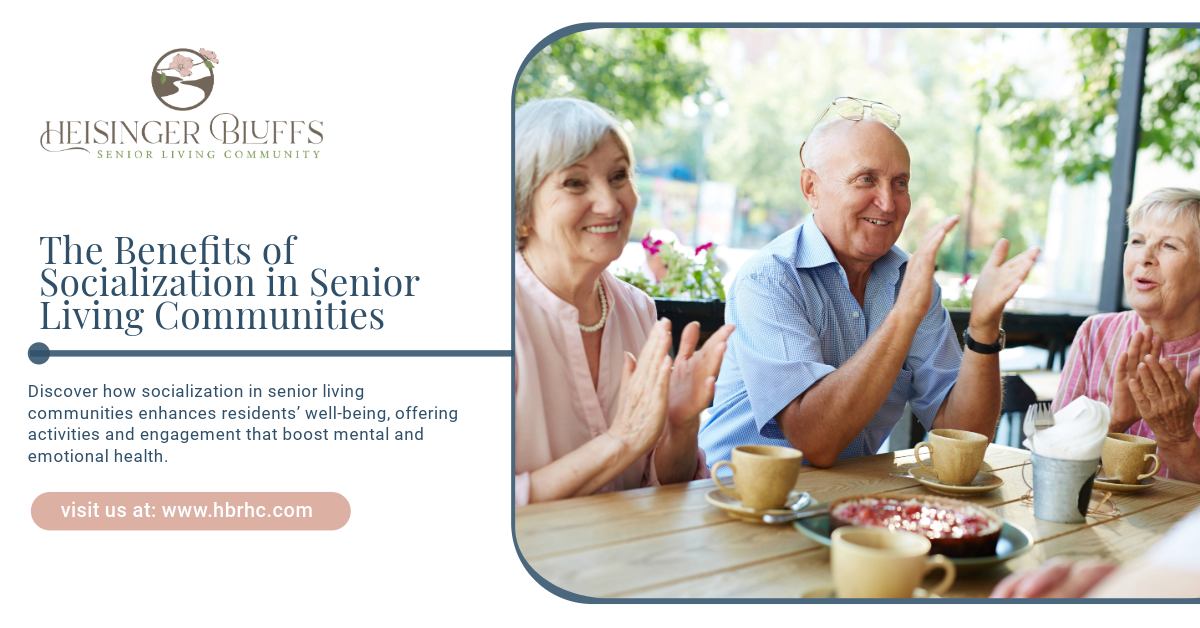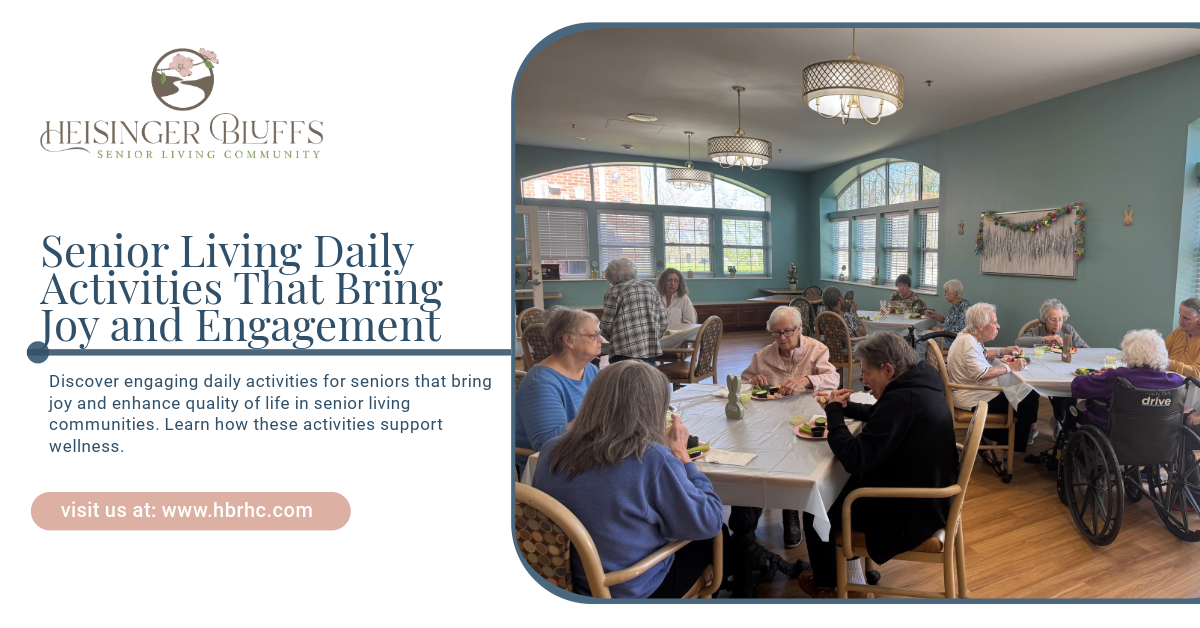The Benefits of Socialization in Senior Living Communities

Socialization in Senior Living Communities
As individuals age, social interactions and engagement become more important for maintaining overall well-being. Senior living communities are uniquely positioned to enhance residents' quality of life by fostering opportunities for socialization and building meaningful connections. Studies have shown that social engagement plays a crucial role in reducing isolation, improving mental health, and promoting physical wellness among seniors.
In this blog, we will explore the benefits of socialization in senior living communities and how structured activities and community engagement can positively impact the lives of older adults.
Why Is Socialization Important for Seniors?
Socialization is more than just having a conversation or being around others—it is the development of meaningful relationships and participation in activities that stimulate the mind, body, and emotions. For seniors, staying socially active provides several key benefits:
1. Improved Mental Health
Social isolation is a significant risk factor for depression, anxiety, and cognitive decline in older adults. Engaging with others helps combat feelings of loneliness and provides emotional support that is crucial for mental health. When seniors regularly interact with peers and participate in community activities, they are more likely to experience an improved mood and a sense of purpose.
In senior living communities, residents have the chance to connect with people of similar ages and life experiences, which can lead to new friendships and increased emotional well-being. Group activities such as game nights, book clubs, and cultural events encourage residents to bond and share common interests, which can help reduce the risk of depression.
2. Enhanced Cognitive Function
Keeping the brain active through social interaction can help seniors maintain cognitive function and slow the progression of age-related conditions such as dementia. According to research, social engagement encourages mental stimulation, which is key to maintaining memory and cognitive sharpness.
Activities like card games, puzzles, trivia challenges, and discussion groups not only provide enjoyment but also stimulate the brain and help improve problem-solving skills. Seniors who are regularly engaged in conversations and group activities may be better able to maintain focus and mental clarity, potentially delaying the onset of cognitive decline.
3. Physical Health Benefits
Staying socially active also promotes physical health. Many senior living communities offer fitness classes, group walking sessions, and other recreational activities that allow residents to stay physically active while enjoying the company of others. Studies show that people who participate in social activities are more likely to stay physically active and maintain a healthy lifestyle.
Regular physical exercise in the company of peers can also reduce the risk of chronic conditions such as heart disease, diabetes, and obesity. For seniors, social activities that incorporate physical movement, such as yoga or dance classes, provide both physical and social benefits, helping them stay engaged and motivated.
4. Increased Emotional Support
One of the key advantages of socialization in senior living communities is the emotional support that residents can offer each other. Living in a community where everyone is going through similar life changes—such as retirement, aging, or health challenges—can foster empathy and understanding. Having a strong social support system helps seniors cope with emotional stresses and provides a safety net during difficult times.
Support groups, spiritual gatherings, and one-on-one connections with fellow residents can all contribute to a sense of belonging and emotional resilience. Knowing that they have a community to lean on gives seniors confidence in navigating the complexities of aging.
5. Greater Sense of Belonging and Purpose
A strong sense of belonging can be a vital aspect of overall well-being. Senior living communities often provide a structured environment where residents can engage in various activities that give them purpose and meaning. Being part of a community helps seniors feel connected to something bigger than themselves, which can improve their self-esteem and overall happiness.
Many senior living communities offer volunteer opportunities, crafting workshops, or mentoring programs, allowing residents to contribute their skills and experiences to the community. These activities not only help individuals feel valued but also provide a sense of fulfillment and joy.
Socialization Opportunities in Senior Living Communities
Senior living communities are designed to promote engagement through a wide range of activities and events. Here are some ways that these communities foster social interaction and meaningful relationships:
1. Planned Social Activities
Senior living communities typically have dedicated activity coordinators who organize events such as movie nights, arts and crafts sessions, board games, and group outings. These activities are often tailored to residents’ interests and abilities, ensuring that there is something for everyone.
- Game nights: Group games such as bingo, trivia, and card games provide fun and friendly competition while encouraging interaction among residents.
- Craft sessions: Engaging in creative activities such as painting, knitting, or pottery allows residents to express themselves artistically while socializing with others.
- Holiday celebrations: Senior communities often host events for holidays, birthdays, and special occasions, creating opportunities for residents to gather and celebrate together.
2. Physical and Recreational Activities
Physical activity is essential for seniors, and when combined with social interaction, it provides even more benefits. Senior living communities often offer fitness classes, walking groups, and recreational activities that promote both physical and social wellness.
- Exercise classes: Low-impact fitness classes such as chair yoga, tai chi, and water aerobics allow seniors to stay active in a group setting while improving strength, flexibility, and balance.
- Walking clubs: Residents can enjoy nature and stay physically active by joining walking groups that explore nearby parks or community gardens.
- Dance classes: Dancing is not only a fun form of exercise but also a great way to socialize. Communities may offer ballroom or line dancing classes, encouraging residents to move and connect.
3. Educational and Cultural Programs
Many senior living communities offer lifelong learning opportunities through classes, workshops, and lectures on various topics, from history and literature to technology and current events. These educational programs stimulate the mind and encourage residents to engage in thoughtful discussions.
- Book clubs: Reading and discussing literature with peers promotes cognitive engagement and fosters intellectual conversations.
- Guest speakers and lectures: Communities often invite guest speakers to present on topics that interest residents, encouraging learning and social interaction.
- Art and music classes: Learning new skills in art or music brings residents together to explore creativity while enjoying each other's company.
4. Spiritual and Emotional Support Groups
For many seniors, spirituality and emotional well-being are important aspects of life. Senior living communities often have chaplains or spiritual leaders who organize group services, meditation sessions, or emotional support groups for residents to gather and share their experiences.
- Spiritual services: Religious services and prayer groups provide residents with a sense of community and shared faith.
- Grief support groups: These groups offer emotional support to seniors dealing with loss, providing a safe space to express emotions and connect with others who understand.
- Mindfulness and meditation: Classes that focus on mindfulness and meditation help residents find inner peace and manage stress, while also allowing them to bond with others.
5. Volunteer Opportunities and Community Involvement
Many seniors find joy and purpose in giving back to their community. Senior living facilities often organize volunteer opportunities within the community or in nearby areas, allowing residents to contribute their time and talents to worthwhile causes.
- Mentoring programs: Seniors can share their knowledge and experience by mentoring younger generations or offering advice to others in the community.
- Volunteer groups: Some senior living communities partner with local organizations, allowing residents to participate in activities such as food drives, charity events, or community service projects.
The Role of Family in Socialization
While senior living communities provide numerous socialization opportunities, family involvement remains important. Regular visits, phone calls, and video chats from family members help residents maintain strong relationships with loved ones, providing additional emotional support.
Family events, such as holiday celebrations or special family days, give residents the opportunity to enjoy time with both their community and family, reinforcing the bonds that matter most.
How to Choose the Right Senior Living Community
When selecting a senior living community, it’s important to consider the level of socialization opportunities available. Look for communities that offer a wide range of activities catering to different interests and abilities. Additionally, assess the staff's commitment to promoting engagement and building meaningful connections among residents.
Many senior living communities offer trial stays, allowing potential residents to experience the social environment before committing. This is an excellent way to see firsthand how the community fosters relationships and whether it aligns with your loved one’s social needs.
Conclusion
The benefits of socialization in senior living communities extend far beyond just reducing loneliness. From improved mental health and cognitive function to enhanced physical health and emotional support, staying socially active has a profound impact on residents' well-being.
At Heisinger Bluffs, we understand the importance of creating a vibrant and engaging community where residents can thrive socially, emotionally, and physically. Our wide range of activities and community events are designed to enhance residents' social lives, providing them with the opportunity to build meaningful relationships and enjoy their golden years to the fullest.












